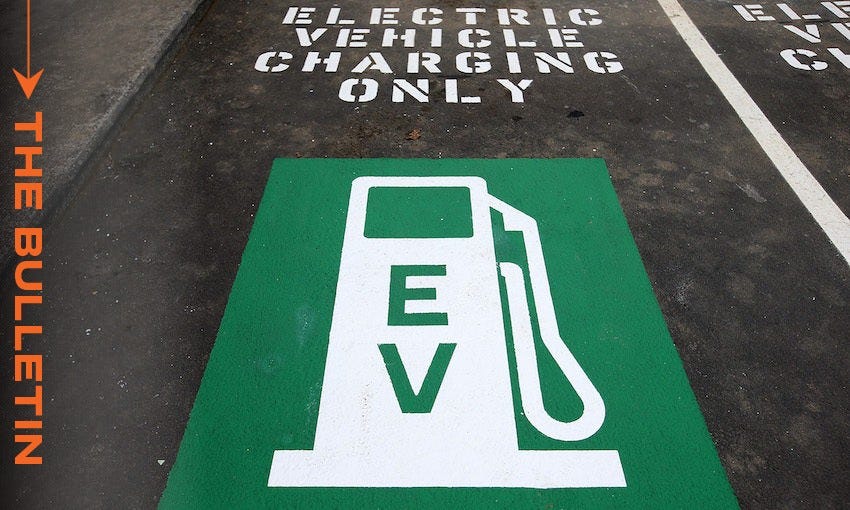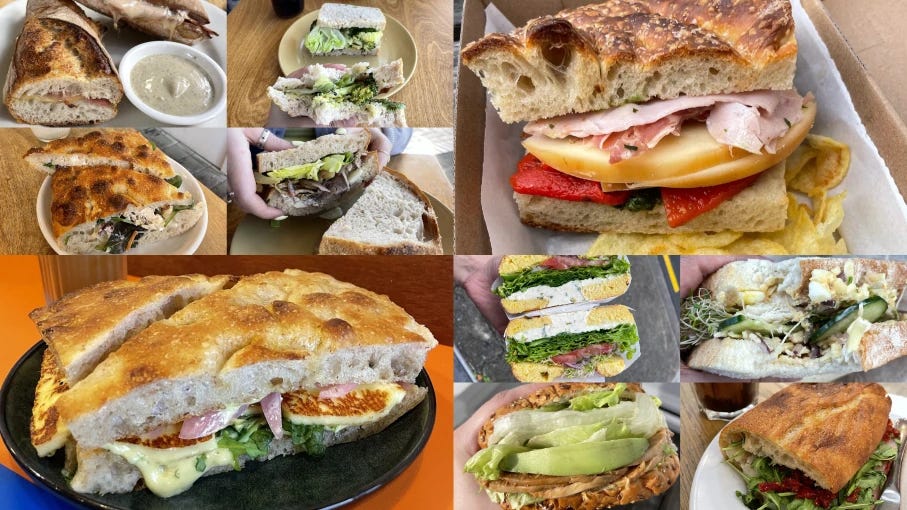Are we gas guzzling our way deeper into the climate crisis?
What the softening of clean car import standards means.
Mōrena, and welcome to The Bulletin for Friday, July 12.
In today’s edition: The prime minister gets some face time with Joe Biden, why nurses are using New Zealand to get work abroad, and charter school applications have opened. But first, how are we tracking when it comes to the uptake of electric vehicles?
A softened approach
Earlier in the week, the government announced it was changing the rules on fuel efficiency for car imports, a move described by RNZ as a watering down of the standards. The new standards will bring us in line with Australia, with the transport minister Simeon Brown describing the two countries as effectively a single market. The clean car standard imposed penalties on the import of certain gas guzzling vehicles and were introduced in an effort to improve the uptake of lower-emitting vehicles, explained George Driver for The Spinoff in 2021. But Brown reckons they made it harder for importers and resulted in car buyers suffering higher upfront costs. Stuff has the updated standards, noting that they will mean certain utes are exempt. As petrol prices creep back up again – more on that below – some are worried that New Zealanders will find it harder and more expensive to buy electric vehicles, and the environment will suffer as a result. So today, a look at the state of the EV market in New Zealand, and whether enough is being done to keep us on the right track.
What could this mean for our EV fleet?
It’s worth noting that the clean car standard is distinct from the already scrapped clean car discount which incentivised buyers to purchase green(er) vehicles. Newsroom’s Marc Daalder reported that the decision to end that scheme resulted in a dramatic drop in electric vehicle sales. Scrapping the rebate was a clear signpost of the government’s intentions for the clean car standards, which cover retailers rather than customers. Both the Motor Industry Association (MIA) and Imported Motor Vehicle Industry Association (VIA) have been vocal about their dislike for the clean car rules, and AutoTalk reports that the MIA “worked extensively with officials to review the standard”.
But lobbying works both ways, and those representing the electric vehicle industry are unsurprisingly unhappy with the latest moves. Drive Electric’s Kirstin Corson told Newstalk ZB’s Ryan Bridge that Australia still has federal and state incentives in place, meaning it remains more attractive to buy an EV across the ditch. That same group released a report last year forecasting that removing clean car policies could see 350,000 fewer EVs on our roads by the end of the decade. Bernard Hickey noted in The Kākā that while Brown might claim he’s creating an equal market with Australia, that country applies tougher penalties on importers for missing their emission targets than we will here under the new rules.
How are we tracking on EV uptake?
In July 2023, wrote Jestin Lester for The Spinoff, 55% of New Zealand new vehicle registrations were low emission, overtaking fossil fuel registrations for the first time in NZ’s history. That trend continued into the latter part of the year, with Lester arguing it showed a “paradigm shift” was taking place in New Zealand. Of course, the aforementioned report by Marc Daalder appears to show that trend has been halted and a follow-up report in May showed the worst quarter sales for new EVs in nearly three years. But are there any moves taking place to try and stem the flow of people back to petrol?
During the election campaign, National promised it would roll out 10,000 new electric vehicle chargers up and down the country at a cost of $257m. There were concerns in June this year, 1News’ Jacob Johnson reported, that the lofty promise could turn out to be “National’s KiwiBuild”, according to an EV advocate. And this week, RNZ’s Eloise Gibson reported that New Zealand was at the bottom of the league table for EV chargers. As of April, Gibson said, we had 1,200 public EV chargers, meaning 130 new ones will be needed every month to meet the 2030 goal. But to justify chargers, you need cars first – an issue that the clean car discount was meant to help address. The government has argued that EV prices are falling and a subsidy was no longer needed to incentivise uptake. Drive Electric’s Kirsten Corson told Newsroom that’s true in part, but we’re still a long way off reaching price parity with petrol vehicles.
A ‘flimsy’ climate strategy
In the same week the clean car standard was watered down, the government unveiled its new climate strategy. The three-page document was light on policy, instead focussing on five core pillars that the government said underscored its “commitment to delivering on our climate change goals”. The Greens labelled the strategy a “pamphlet”, however, while Labour’s Megan Woods said it was “flimsy and backwards looking”. Meanwhile, this morning, the government has announced it wants to tackle “excessive use” of road cones and temporary speed restrictions on our roads, reports Thomas Coughlan at the Herald.
I promised we’d swing back to petrol prices to finish. Stuff’s Brianna McIlraith took a look at this last month, talking to AA’s Terry Collins who noted that fuel prices appeared to be following the same trend as last year: rising, falling and then rising again. The good news is they should ease back again by the end of the year. But don’t expect petrol to be cheap ever again.
Like what you read? Become a member!
Every contribution exclusively funds our journalism and helps keep it freely available to all. Join up today!
Already a member? Ka nui te mihi, your support means the world to us.
Luxon meets Biden, calls out Russia
The prime minister has secured some elusive face time with the US president. Christopher Luxon met Joe Biden briefly at a dinner hosted at the White House, reports Stuff’s Tova O’Brien, though little is known about what the pair discussed. A statement shared via media said that Biden, who is facing pressure to quit the presidential race, expressed his love for New Zealand. The two had a chance to reconnect after a meeting of IP4 countries (New Zealand, Australia, Japan and South Korea). The Post’s Luke Malpass reported Biden had an “intimate pre-meeting” with the four leaders of these countries, Luxon included.
Meanwhile, with Australia’s PM absent from Nato, it was Luxon that chaired the IP4 meeting, wrote the Herald’s Claire Trevett. The leaders were joined by Ukraine president Volodymyr Zelenskyy. Luxon took aim at China and North Korea for their support of Russia. “The intensifying military relationship between Russia and the DPRK, and China’s role supporting the rebuilding of Russia’s industrial base demonstrates the indivisibility of security issues between Europe and our part of the world in the Indo-Pacific,” Luxon said.
Why so many nurses move to NZ – but don’t plan to stick around
The Spinoff’s Shanti Mathias looks at why New Zealand struggles to maintain its health workforce, reporting on how some international nurses are migrating here in order to secure work in countries like Australia. Our nursing workforce grew by 1,300 full-time equivalent nurses between March and September 2023, Mathias notes, but there’s limited data available on the number choosing to then leave. Saju Cherian from the New Zealand Nurses Organisation says that while many international nurses will stay here if they get a good job, there are reasons for using New Zealand as a pitstop, such as the structure of exams. An individual is allowed to sit the exam multiple times, and if they pass the first section once, and the second section a separate time, these scores can be combined.
Listen: Bill English’s big ideas for Kāinga Ora
Former PM and finance minister Sir Bill English is the intellectual driving force behind the new government’s plans for the country's biggest landlord. He tells Bernard Hickey on When the Facts Change this week why a full accounting of its running costs may prove to be too rich for the government.
Click and Collect
Charter school applications have opened, with minister David Seymour expecting the first will open their doors to pupils in 2025. Still a bit confused as to what a charter school is? Here’s a helpful explainer. Meanwhile, from Newsroom, here’s a recent piece looking at one school hoping to be reopened under the charter model.
A new advisory group has been launched for victims of retail crime as part of the government’s “tough on crime” crackdown.
There’s been a lot of troubling headlines about Boeing. So why is Air New Zealand doubling down on Dreamliners?
Food prices have finally started to come down – though only slightly – according to the latest Stats NZ figures.
Aratere grounding: Winston Peters alleges cover-up over Interislander crash. As Thomas Manch writes, the acting prime minister has racked up a lot of media airtime this week from “just asking questions”. But in The Post today, the crew onboard the Aratere dispute the findings of a report suggesting a button pushed by mistake sent the ship off course.
I’m not just sharing this week’s Media Insider because the gentle mocking of my Bulletin headline from yesterday is the first time I’ve cropped up in the column. This week, Shayne Currie has an interesting interview with media minister Paul Goldsmith who wants RNZ and TVNZ to work more closely together. Currie recently reported the two outlets may soon be working under one roof. The Bulletin had heard whispers of a possible newsroom merger of TVNZ and RNZ a few months back. At the time, TVNZ told me this was not accurate.
Synlait notches “small victory” ahead of huge equity raise (paywalled).
Shelley Duvall, star of The Shining and Annie Hall, dies aged 75.
Bryer Oden conducts a tasting tour of Wellington's best sandwiches. Lyric Waiwiri-Smith learns that watching football at 7am can be fun after all. 'It's super hard to dance with a pig snout and a mohawk' Claire Mabey learns from interviewing the dancer turning a beloved picture book into a ballet. Madeleine Holden argues that everyone should drive sitting bolt upright. Hera Lindsay Bird offers advice about how to raise a child who is a reader.
That’s it for The Bulletin this week, thanks for reading. I’ll see you back here on Monday. Have a wonderful weekend!
Let me know in the comments, or get in touch with me at thebulletin@thespinoff.co.nz, if you have any feedback on today’s issue or anything in the news.
If you liked what you read today, share The Bulletin with friends, family and colleagues.
















EVs & compulsory solar arrays on new builds wired direct to the grid. Short term cost for medium/long-term gain for both owners & country/planet. Govt happy to put their fingers/fists on scales for their mates but not for things that benefit everyone🤬